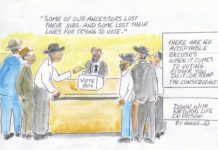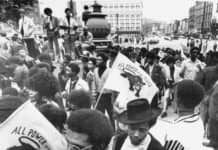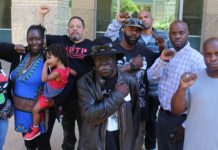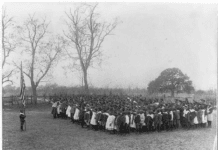
by Kevin ‘Rashid’ Johnson, Minister of Defense, New Afrikan Black Panther Party
(Written in 2006*) – “Single acts of tyranny may be ascribed to the accidental opinion of a day; but a series of oppressions, begun at a distinguished period and pursued unalterably through every change of ministers, too plainly prove a deliberate, systematic plan of reducing [a people] to slavery.” – Thomas Jefferson: Rights of British America, 1774
United States Constitution, 13th Amendment
“Section 1. Neither slavery nor involuntary servitude, except as a punishment for crime whereof the party shall have been duly convicted, shall exist within the United States, or any place subject to their jurisdiction.
“Section 2. Congress shall have power to enforce this article by appropriate legislation.”
Universal Declaration of Human Rights, Article 4
“No one shall be held in slavery or servitude; slavery and the slave trade shall be prohibited in all their forms.”
With the ratification of the 13th Amendment to the U.S. Constitution in December of 1865, it would seem that slavery was officially abolished in all areas of the U.S., but for the seemingly minor exception of punishment for a crime. Yet, notwithstanding the occupation of the South by the Union Army, the ink was not dry on the parchment when the dreaded “Black Codes” began to be enacted to put the newly freed slaves back into chains.
Ex-slaves who could not prove they had regular employment were arrested and ordered to pay a stiff fine. If they could not pay, they were hired out in involuntary servitude.
Black children were condemned to serve as apprentices in local industry. The chain gang and contract labor became a regular feature of the political economy, alongside sharecropping, Jim Crow segregation, lynching and KKK terror.
Deprived of the vote, citizenship was an empty cup. Despite the gains of the Civil Rights Movement, the chain gang is back, and so is contract labor for prisoners. In the 10 former slave states, those who have ever been convicted of a felony are denied the right to vote, as are all of the more than 2 million prisoners throughout the U.S.

All across America, we have witnessed the rise of a new era of slavery, as prison populations have more than tripled in the past three decades. The lines between the criminal justice system and free enterprise have been blurred with the rise of the prison-industrial complex.
The mostly Black, Hispanic and Native American prison populations are ground down by cruel and unusual punishment while being denied a political voice and basic human rights and dignity and are subjected to exploitation by multinational corporations as a captive labor force. This has nothing to do with rehabilitation. You can’t teach citizenship through slavery!
To put an end to this cruelest of oppressions and violation of the inalienable rights of the People, we call for the immediate amendment of the 13th Amendment to end slavery for all, and the extension of universal suffrage to all, including prisoners.
We declare all elections not based upon full universal suffrage to be invalid and powers not derived from the consent of the governed to be usurpations.
NO INCARCERATION WITHOUT REPRESENTATION!
BOYCOTT THE ELECTIONS!
ALL POWER TO THE PEOPLE!
Send our brother some love and light: Kevin Johnson, 264847, Pendleton Correctional Facility, G-20-2C, 4490 W. Reformatory Road, Pendleton, IN 46064.
*Rashid suggested this article be republished now to contribute to the discussion and debate about whether or how we should choose our form of government and who should represent us. It originally appeared on his website, at http://rashidmod.com/?p=478. Electoral politics has been a lively and sometimes acrimonious topic on the left for decades that must be revisited frequently as circumstances and public opinion evolve and new ideas are raised and new opportunities revealed. Readers are encouraged to weigh in.

 Store
Store











